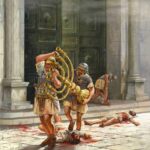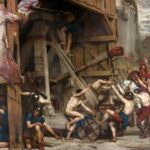The Flavian Amphitheater was an amazing construction for ancient times. The engineers took care of every detail to such an extent that they even anticipated the possibility of spreading a special canvas roof that was stretched over the stands on hot days. It was referred to as velum or velarium. The audience could also count on another form of coolness.
As mentioned by Seneca the Yougher, on special occasions over the heads of the spectators of the gladiatorial games, a refreshing mist (sparsio) was sprayed, sometimes carrying the smell of pleasant fragrances. Another version of sparsio was the scattering of gifts or tokens among viewers – they were referred to as missilia. Such facilities were also introduced at the Colosseum.
The rulers tried to take care of the audience, who, being a representative of the Roman people, could express adoration for the emperor in the event of successful games. For example, the Emperor Titus Flavius, in order to celebrate the opening of the Colosseum, ordered the audience to throw wooden balls into the public square. There were names of various kinds of awards on them: food, jewelry or slaves. Domitian in turn gave the audience exotic fruit and rare products.







